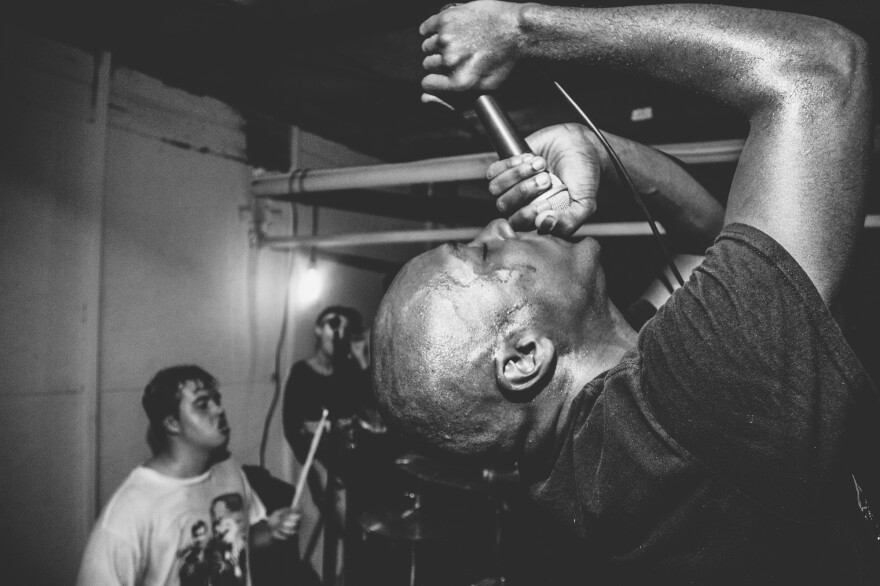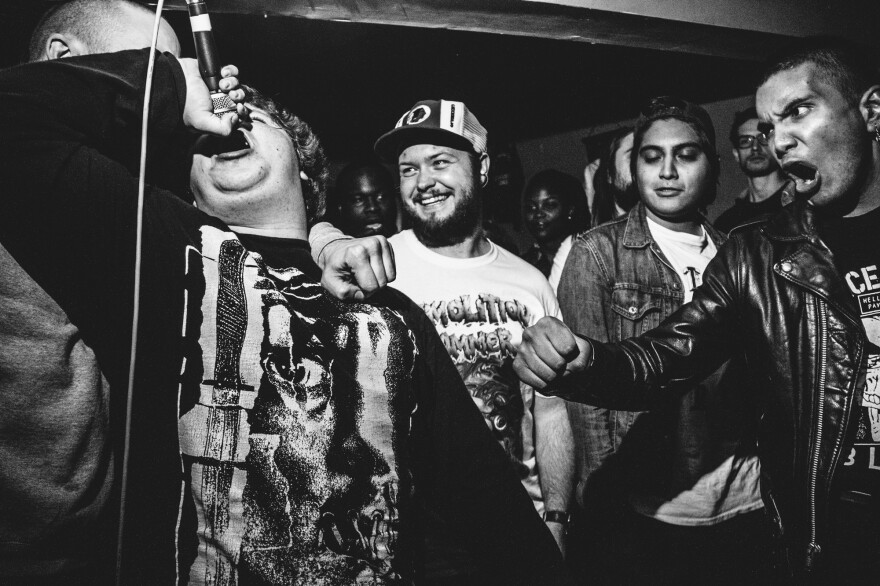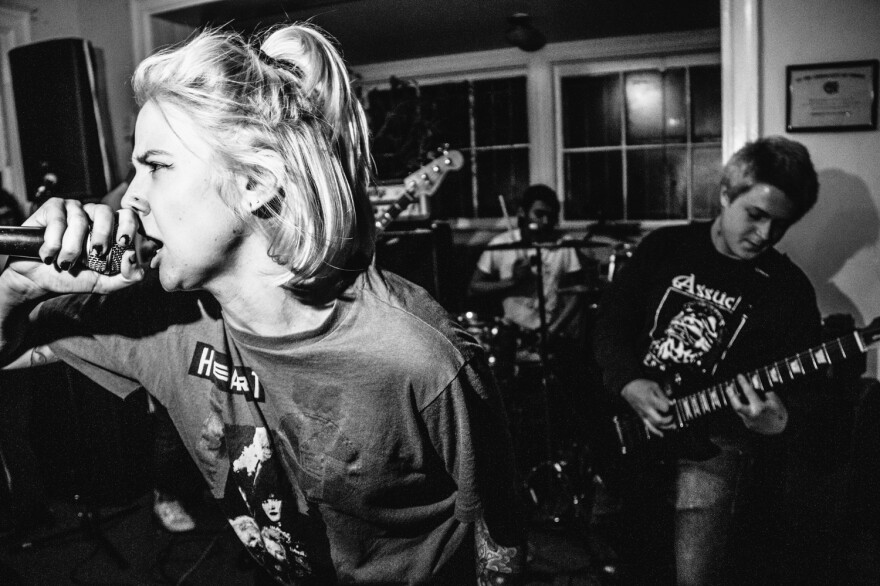Rob Watson was ready for something new.
At 9 p.m. on a Friday in February, Watson was standing outside of La Casa, a micro-church and community center — whose main chapel is the size of your parents' spacious living room — nestled next to a tienda in Washington, D.C.'s Mount Pleasant neighborhood. Inside, a hardcore punk band called Unknown Threat had just taken the stage.
Of course, there was no actual stage. There was just the floor where the band set up at one end of the room, and the dozens of fans in attendance who stood everywhere the band wasn't and this is more or less what punk looks like. Once Unknown Threat hit its stride a few songs into its set, those standing closest to the band churned into motion, ricocheting off of one another and swinging arms wildly, seemingly unconcerned whether friend or foe caught a fist to the face.
But to Watson, who has performed in bands and booked shows in D.C. for years, the city's punk scene, at this moment, feels complacent. He says he has watched the scene he helped build lose urgency, at least at home.
Looking at it from the outside, 2015 was a banner year for D.C's storied punk scene, which first rose to prominence in the early 1980s and has become an on-again, off-again fixture in the local music ecosystem. But at no point since those heady days of Bad Brains and Minor Threat has the local product been so talented, prolific and diverse. After years of being a primarily local concern, D.C. punk matters to the wider underground music world once again.

But that's the rub, Watson says. D.C.'s punk scene broke nationally last year, with multiple bands releasing well-received albums, joining major tours and crossing international borders to play for punk contingencies abroad. More than a half-dozen new wave D.C. hardcore bands released albums or EPs last year, including scene stalwarts , and . Those three bands also toured the U.S. at various times, while Protester spent a week in Mexico in December. But while established bands rose in prominence as they performed around the country, some within the scene grew frustrated as momentum and enthusiasm at home lagged. When those established bands played gigs within the city limits, fans oftentimes stood with arms crossed and nodded along — not the ideal reaction to a genre that often inspires a hail of spin-kicks and stage dives from its audience. "We just assumed it's because everyone is in the same bands. For most people it's like, if I've seen one, I've seen it all," Watson says. "We played lackluster shows, attendance was low. People weren't having a lot of fun."
So Watson organized the La Casa showcase to help introduce an even newer crop of local hardcore acts to the scene. He wanted to shift the spotlight, he says, from those bands releasing albums to bands still recording demos in basements and playing their first few gigs. As it turns out, those new bands are not only out there — they're musically and stylistically far beyond where most bands are at that point in their existences. It's as if the rising tide of the scene has indeed lifted all boats. Once young and scrappy by necessity, the D.C. hardcore scene is reaching something like maturity.
Even when the city was trudging through an indie-rock malaise in the mid-aughts, punk bands peppered the underground. and — and, before them, Magrudergrind — anchored the scene through the late aughts and early this decade. Around the same time, grew to borderline-legend status in D.C. and nationally with its brand of posi-vibes punk and savage live shows.
Although punks in D.C. now are loathe to talk about it, the city's historic hardcore scene continues to cast shadows over the genre. Minor Threat, the early 1980s hardcore punk band led by Ian MacKaye, defined the genre in nearly every conceivable way — sonically, politically and spiritually. That scene, and the Revolution Summer movement a few years later, produced a greater number of significant punk bands than perhaps any in the country's history: Bad Brains, Youth Brigade, Government Issue, Void, Rites of Spring, Bikini Kill, Nation of Ulysses and dozens of others. There's always been punk in the capital, but after those first few waves of hardcore bands faded away through the 1990s, the scene lacked the depth of bands and musicians necessary to restart that initial momentum.
But everything changed in 2015. Last year, a new crop of young, hungry D.C. punk bands unleashed a series of generally excellent albums upon a city where hardcore punk is written into the genetic codes of dejected suburban youth and city stalwarts alike. The nickname that has stuck to the new scene — The New Wave Of D.C. Hardcore — somehow feels like an important marker in the anthropological sense, a name that makes the scene cohesive and preserves its existence. It has produced a hardcore punk compilation album that will in all likelihood be remembered as the most important memorial to the D.C. scene since Dischord Records' seminal 1982 mashup Flex Your Head. And it has launched its best bands on national tours to spread the NWODCHC gospel to all corners of the punk world.
Ace Mendoza, arguably the most talented guitar player in the city's punk scene, is the brain behind The Red Line Comp, the groundbreaking hardcore punk compilation named after the D.C. subway line that connects the district's northern suburbs of Bethesda and Silver Spring with the city center. Mendoza says that when his bands play outside of the city, concertgoers appear shocked that D.C. is again home to such a panoply of punk bands.
Most of the dozen bands appearing on The Red Line Comp also released music on their own during 2015 — an incredible amount of productivity for any one music scene, regardless of genre. Red Death, which borrows as much from Corrosion of Conformity crossover thrash as it does from D.C. hardcore heritage, last April released Permanent Exile, a brutal, nine-song full length. That same month, street punks Pure Disgust dropped Chained, a six-song firehose of sound aimed squarely at racial inequality — a throwback political punk voice for a new civil rights movement. Protester — perhaps the most faithful representation of 1982-era D.C. and New York hardcore in the scene — released two outstanding EPs over the course of the year, including this winter's Paincave Sessions, which will feed into a full-length record later this year. , , and Spite all issued demos or EPs. , Civic Duty — the list goes on. And death metal purveyors released the excellent Forged Through Domination LP that snuck into the NWODCHC roster with its occasional driftings into straight-ahead punk.
If the timing here seems exceptional — nearly a dozen recordings from a formerly stagnant music scene in the course of a year — that's because it is. Bands don't often rise up like a crop of wheat and simultaneously produce the jubilee of records that the D.C. scene has over the past 12 months. The tie that binds, and that propels the scene forward, is the musicians. There are fewer than one might expect.

For all of its recent success and productivity, the D.C. punk scene is remarkably small. The most notable and productive bands revolve around a nexus of just a few prolific young musicians; set changes at live shows often devolve into a game of musical chairs where the drummer becomes the vocalist, the guitarist becomes the drummer and suddenly, a new band is playing.
Connor Donegan performs in no fewer than seven bands at the moment, including Protester, Red Death and Pure Disgust, perhaps the scene's most acclaimed acts. Robin Zeijlon plays with Donegan in both Pure Disgust and Protester, along with another nine local hardcore bands of varying notoriety. And Mendoza, the guitarist, anchors at least four D.C. punk bands, including two with Donegan — Pure Disgust and Red Death.
To say the scene is tight knit is an understatement. Over the summer, the organizers of In It Together Fest, a D.C.-based multi-venue music and art festival, attempted to book a few NWODCHC bands for the festival's punk-heavy Friday night basement show. They couldn't. Red Death was out on tour at the time, and with Donegan, Mendoza and Zeijlon out of town, they struggled to assemble another band to play the festival. They filled the bill with , one of the few D.C. hardcore bands without overlapping membership.

Donegan says the evolution of the scene, and its drastic overlap in band membership, happened organically. The main actors grew up together in those northern D.C. suburbs serviced by the red line train. Donegan and Mendoza went to middle school and high school together and have been playing in bands since they were both 15.
"We're all friends; we've always been friends," Donegan said in an interview last summer, when Red Death and Protester were both playing a gig (Donegan was pulling double duty as the singer in one band and drummer in the other). "There was just a time that we were all discovering new music and getting really excited about exploring what we could do artistically. And then sort of going for it."
Those efforts have produced incredible results for the young scene and have placed sometimes welcome distance between this new wave of bands and the towering names that haunted D.C. venues 30 years before. Donegan says he does his best to represent that legendary scene in the wider world of hardcore punk — he thinks the historic New York and Boston scenes get more attention than D.C., without reason. But most members of the current scene tire of answering questions about Minor Threat and Government Issue. In the unique bends of punk space-time, those bands are ancient history — the Paleozoic Era of punk.
There are risks with such concentrated band membership, of course. If one or two of the core group were to move away for whatever reason, the scene, or at least multiple bands now central to it, would struggle to continue. "If it happens, it happens," Donegan says. "We'll keep pressing on."

But at least these NWODCHC bands are touring, out spreading that punk gospel. And looking around, he sees an even newer crop of hardcore punk bands forming and playing gigs that have no real connection to his crew.
At the La Casa show, two bands were playing their first-ever gigs: Unknown Threat and , which includes Watson and some of other scene mainstays. Others had just released demos, or were waiting for their first EPs to drop. The influence of the established NWODCHC scene remained — Stuck Pigs and , a band Watson touted as the new face of the scene, included Mendoza, Donegan and other scene mainstays. But other bands on the bill truly represented the scene's expanding presence — fresh faces rejuvenating the local product.
That's a reality of punk on a hyper-local level. Even as big-ticket music festivals drag the same dusty collection of punk rock retreads out of retirement year after year, local punk scenes require a constant influx of fresh bands to keep the heart of the thing beating — to maintain the kind of momentum the early Dischord Records scene lost at some point. Without these new bands — and without Watson and others slipping into an ambassadorial role, despite their own youth — even the most vibrant scene can be stricken with fatigue, or worse: complacency.
Laura Newhauser fronts Iron Cages, a speedy, political punk band that opened the showcase. The band has been together for about seven months, Newhauser says. The showcase was one of its first gigs. To her, the current D.C. hardcore scene is an increasingly expansive and inclusive one. "I think a lot of people are working really hard to put shows like this together, with new bands, to get people to form [more] new bands. Really, it's a growing scene right now," she says, standing outside after the show.

She says she knows the people in those now-established bands, but not well. In organizing and promoting precisely these kinds of showcases, Watson and others are building bridges across different generations within the scene and creating space for newer bands to thrive, she says.
"For a little while, you have a lot of bigger bands coming out, but not a lot of new bands," Neuhauser says." Now, there are a lot of new bands, and those bigger bands are helping the new bands get recognized."
So far, that plan is working. When Stand Off ripped into those first notes of its brutally fast, throwback punk, the crowd went haywire. That included Donegan and other NWODCHC band members, among the throngs of kids rumbling from one side of the tiny church to the other, bashing into one another, reckless. At one point, someone accidentally clotheslined themselves on a photographer's cable, then kept charging along, unfazed. It was just what a hardcore show should look like. Anyone standing around with their arms crossed would have been bowled over.
Copyright 2021 NPR. To see more, visit https://www.npr.org. 9(MDAxNzg0MDExMDEyMTYyMjc1MDE3NGVmMw004))







